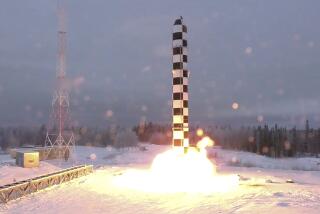U.S. Shifts Goal as India Digs In Heels on Nuclear Treaty
- Share via
WASHINGTON — With the generation-old dream of an international ban on nuclear testing hanging in the balance, the Clinton administration on Wednesday unveiled a fallback strategy designed to prevent India from blocking further action on the accord.
In a tacit concession that the United States and its allies have not budged India from opposing a treaty accepted by almost all other countries, John Holum, director of the U.S. Arms Control and Disarmament Agency, said Washington’s goal now is to persuade New Delhi to let the accord come to a vote in the U.N. General Assembly next month. That would let the treaty advance to the next level of approval, even though India continues to refuse to sign it.
Under the arcane rules of international lawmaking, India holds what amounts to a double veto of the test-ban treaty. A unanimous vote is required in the Conference on Disarmament to send the accord to the General Assembly for consideration. Even if the conference and the General Assembly approve the pact, it will not take effect unless signed and ratified by all countries with a nuclear potential, of which India is the only announced holdout.
“We’re not at this stage pressing the signature issue,” Holum said. “What we’re pressing is, ‘Don’t block this treaty.’ ”
The U.S. strategy seeks to buy time. Unless the disarmament conference completes its work by the end of next week, Holum said, it will be impossible to make needed preparations for a U.N. vote before the current General Assembly session ends. Once a new session convenes Sept. 16, the entire process must start over, a setback Holum said would scuttle a treaty--for years.
“There is no improvement to be gained by further negotiation,” he said. “Nobody can say that this treaty is unfair. Everybody can find reasons to be disappointed with it, but it is a fair outcome to the disputed issues.”
China, which had been resisting the accord, withdrew its opposition Wednesday, diplomats in Geneva said.
But India has said it will not agree to the test ban until the five acknowledged nuclear powers--the United States, Russia, Britain, France and China--agree to dismantle their arsenals, a step that none is now willing to take.
To be effective, the treaty must be signed and ratified by those five powers and by the three “threshold” states--India, Israel and Pakistan--that are known to have nuclear weapons potential and have not signed the Nuclear Non-Proliferation Treaty.
Technically, the test-ban treaty would take effect when ratified by the 44 countries now with at least one nuclear research reactor; all those countries, except for the five nuclear powers and three threshold states, have already agreed to a test ban by accepting the nonproliferation pact.
If the treaty goes to the General Assembly, India will be pressured to accept it. All members of the global community also would be subject to heavy pressure to adhere to a test ban.
If the treaty is signed by most nations, Holum said, “that . . . will have an enormous influence as a global consensus against nuclear explosive testing.”
More to Read
Sign up for Essential California
The most important California stories and recommendations in your inbox every morning.
You may occasionally receive promotional content from the Los Angeles Times.













